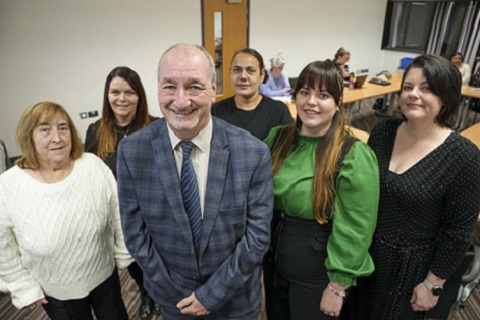The findings from collaborative work between a University of Wolverhampton academic and a Midlands based charity has resulted in exciting new menopause initiatives for Deaf and hard of hearing people.
During 2018, Sarah Bown, Senior Lecturer in Interpreting and Deaf Studies, approached BID Services Birmingham, a regional and national charity for Deaf people to propose a pilot study to ascertain the experiences and needs of Deaf sign language users and hard of hearing individuals during the menopause.
In November 2018 two pilot workshops were conducted by Sarah in partnership with BID Services, focusing on the menopause as experienced by Deaf and hard of hearing individuals in Birmingham and Solihull.
The feedback from participants indicated a greater need for accessible information and support across a wide range of ages.
Sarah said: “Despite existing legislation such as the Equality Act 2010, Public Sector Equality Duty 2011 and NHS Accessible Information Standard 2015, the health inequalities experienced by Deaf individuals are well documented.
“At that time, amongst wider society, there was growing awareness and discussion about the menopause, its impact upon people, access to specialist health care services/support and the understanding required during this transitional phase of a person’s life. These successful pilot studies showed that Deaf and hard of hearing individuals face greater barriers than most in fully accessing fundamental aspects of care, being able to understand the process of that care/treatment options and the knowledge to be able to make informed choices.
“The success of the pilot studies led to further gathering of data during 2019 across services managed by BID in other parts of the country. The feedback, also posted on the Sign Health website, overwhelmingly demonstrated significant need across different age ranges for tailored education; advice/guidance; opportunities for Deaf and hard of hearing people to share their experiences together; learn about the menopause from appropriately trained medical professionals in a shared forum; receive support and, become sufficiently equipped in order to make informed decisions about their healthcare and lifestyle choices.
“I am delighted to see the journey of this research initiative come to further fruition in this latest development by BID Services for the communities it serves. It is the culmination of many combined efforts along the way, and it has been the greatest of pleasures to work with BID in an advisory and collaborative capacity. The impact from the results of this research has also informed the teaching curriculum on the British Sign Language (BSL) interpreting programme here at the University. It is a topic now included within the students’ translation/interpreting education.
“This is important because first contact with the menopause and Deaf sign language users for the majority of interpreting graduates will be in Primary Care during an interpreting appointment at a GP’s surgery. This preparation can only help to enhance the interpretation they provide to Deaf people and medical professionals within that setting.”
Debbie Lang, Sensory Service Manager at BID Services, said: “We are excited to announce that we have secured funding to deliver a project aimed at raising awareness of the menopause amongst those who are D/deaf/hard of hearing in Birmingham. BID Services is a charity which specialises in enabling and empowering those who are Deaf, hard of hearing, sight impaired, severely sight impaired or Deafblind to live the lives they choose and achieve their goals through delivery of specialist services.
“Between July 2023 and March 2024, BID Services, working in partnership with My Menopause Centre, will be delivering a series of workshops offering a deep dive into the menopause exploring everything from myths and hormone replacement therapy to managing the menopause at work and loss of libido. The research conducted by Sarah from the University of Wolverhampton and BID Services, identified that many D/deaf/hard of hearing individuals lacked awareness around the menopause, signs, symptoms and treatment and had limited access to support and advice.
“The evidence gained through the University of Wolverhampton’s research proved vital in helping us to secure funding and effect real change, increasing access to information for those who are D/deaf/hard of hearing in Birmingham.” Workshops will be taking place at the Deaf Cultural Centre in Ladywood from July 2023 onwards. All workshops will have British Sign Language interpreters present and will include an information session followed by a Q&A.












